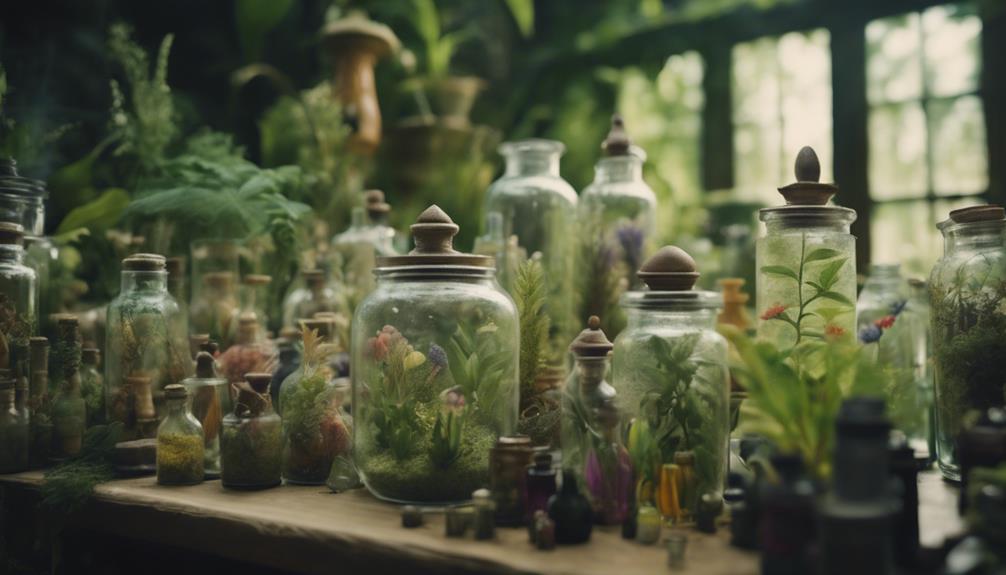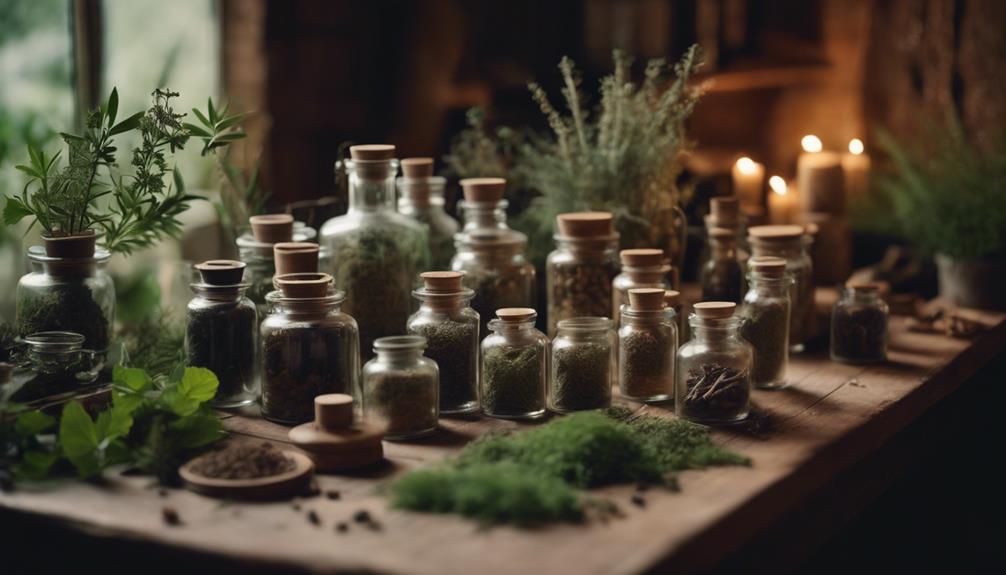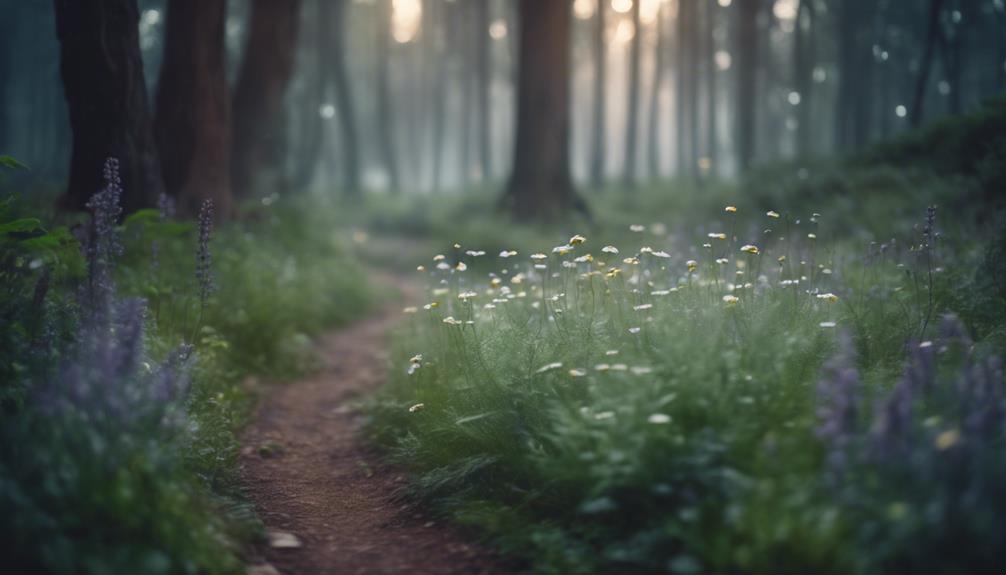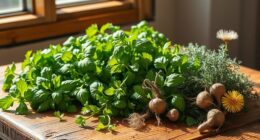We're celebrating seven pioneering female herbalists who are making waves in herbal medicine. Rosemary Gladstar, founder of the California School of Herbal Studies, has inspired a new generation of herbalists. Susun Weed is a renowned author and advocate for women's health. Jeannine Parvati pioneered lotus birth and natural birthing methods. Catherine Hunziker is a leader in sustainable harvesting practices and herbal innovation. Erin Masako Wilkins is on a mission to decolonize herbalism, and Bevin Clare is advancing modern herbal medicine. These women are reshaping the industry, and as we explore their accomplishments, we'll uncover the depth of their contributions to the world of herbal medicine.
Key Takeaways
• Rosemary Gladstar founded the California School of Herbal Studies and co-founded Traditional Medicinals herbal tea company, inspiring a new generation of herbalists.
• Susun Weed published 'Wise Woman Herbal for the Childbearing Year' and offers apprenticeships and courses in herbalism, focusing on women's health and holistic healing practices.
• Jeannine Parvati popularized lotus birth in the United States and developed herbal remedies for women's health, advocating for women's autonomy in healthcare.
• Catherine Hunziker pioneered the use of medicinal plants in modern healthcare, developing innovative herbal formulations and educating students at the Rocky Mountain Center for Botanical Studies.
• Erin Masako Wilkins promotes inclusive healing spaces honoring cultural heritage, crafting products respecting cultural traditions and building a community valuing ancestral wisdom and modern practices.
Pioneering Women in Herbalism
Throughout history, pioneering women in herbalism have played a significant role in shaping the course of herbal medicine, often overcoming obstacles and breaking barriers to share their knowledge and skills with their communities.
As herbalists, they've demonstrated remarkable expertise in harnessing the power of plants to promote health and wellness.
During the Dark Ages, folk healers in Europe, mostly women, provided essential healthcare services despite lacking formal training, laying the groundwork for future female herbalists.
Later, Hildegarde von Bingen's groundbreaking work in Traditional European Herbal Medicine paved the way for future generations.
In the Americas, Indigenous and African-American women utilized their advanced herbal knowledge to benefit their communities.
Even during the Civil War, Harriet Tubman employed herbal medicine to aid escaping slaves and Union soldiers, showcasing the potency of herbal healing.
These female herbalists have been instrumental in shaping the course of herbal medicine, ultimately contributing to the Herbal Renaissance of the 1960s and 1970s, which revitalized herbalism and paved the way for modern female herbalists to thrive.
Rosemary Gladstar: A Legacy

With her pioneering spirit and unwavering dedication, Rosemary Gladstar has left an indelible mark on the world of herbalism, inspiring generations to come. Dubbed the 'Godmother of Modern Herbalism,' Rosemary's legacy is a testament to her tireless efforts in promoting herbalism and traditional medicinals.
As the founder of the California School of Herbal Studies, she's empowered countless students to explore the world of herbalism. Her contributions to the field are multifaceted: she co-founded Traditional Medicinals, a successful herbal tea company, and served as the founding President of United Plant Savers, an organization dedicated to preserving medicinal plants.
Rosemary's lifelong passion for herbalism was ignited by her grandparents and early exposure to plants on a dairy farm. Throughout her career, she's authored 13 books on herbalism, cementing her reputation as a leading authority in the field.
As we reflect on Rosemary's remarkable legacy, we're reminded of the profound impact she's had on the world of herbalism, inspiring a new generation of herbalists to carry the torch forward.
Susun Weed: Empowering Women

As we explore the world of herbalism, Susun Weed stands out as a pioneering figure, dedicating her life to empowering women through the power of herbal medicine and holistic healing practices. With over five decades of experience in herbalism, Susun has been a driving force in promoting women's health and well-being.
Her influential book, 'Wise Woman Herbal for the Childbearing Year,' published in 1986, has been a valuable resource for herbal healers and women seeking natural remedies.
Through her apprenticeships and courses, Susun has trained numerous herbal enthusiasts, passing on her extensive knowledge of herbalism. Her prolific writing career has yielded multiple works on herbalism and women's health, cementing her status as a leading authority in the field.
Susun's mission to empower women is evident in her teachings, which focus on the importance of herbal medicine and holistic healing practices in maintaining overall wellness. As a respected figure in the herbal community, Susun continues to inspire and educate, leaving a lasting impact on the world of herbalism.
Jeannine Parvati: Holistic Healing

We turn to Jeannine Parvati, a pioneering figure in holistic healing, who dedicated her life to empowering women through the power of herbal medicine and natural birthing practices. As a midwife, prenatal yoga teacher, and activist, she advocated for holistic healing through herbs, emphasizing the importance of traditional healing practices in modern healthcare.
Jeannine Parvati's work centered on empowering women to connect with their bodies and nature through herbal medicine. Her book, 'Hygieia: A Woman's Herbal,' focuses on herbal remedies for female experiences like childbirth and menopause.
Some of her notable contributions include:
- Popularizing the practice of lotus birth in the United States, emphasizing natural and gentle birthing methods
- Developing herbal remedies for women's health, focusing on menopause, childbirth, and menstruation
- Advocating for women's autonomy in their healthcare, encouraging self-care and self-awareness
- Creating prenatal yoga programs, promoting physical and emotional well-being during pregnancy
- Educating women about the importance of natural birthing methods, reducing medical interventions in childbirth
Through her work, Jeannine Parvati has made significant contributions to the field of herbal medicine, empowering women to take control of their health and well-being.
Catherine Hunziker: Herbal Innovation

As we explore Catherine Hunziker's contributions to herbal medicine, we're struck by her innovative approach to plant-based product development, which prioritizes sustainable harvesting practices that guarantee the long-term health of the environment.
Her expertise in creating herbal remedies for wellness is unparalleled, and we're excited to examine her work in this area.
From her commitment to quality and efficacy to her dedication to promoting health and wellness, Catherine's impact on the industry is undeniable.
Plant-Based Product Development
We're thrilled to explore the world of plant-based product development with Catherine Hunziker, a renowned expert in the field of herbal medicine. Catherine Hunziker's expertise in plant-based product development has led to the creation of a diverse range of herbal remedies tailored to meet various health needs. As a senior professional herbalist with over 20 years of experience, she's made significant contributions to the field of herbal medicine.
Some of her notable achievements include:
- Developing innovative herbal formulations that address specific health concerns
- Creating organic remedies that are free from harsh chemicals and toxins
Educating students at the Rocky Mountain Center for Botanical Studies on the art of herbalism
- Building a successful business, WishGarden Herbs, that prioritizes sustainability and quality
- Pioneering the use of medicinal plants in modern health care, bridging the gap between traditional herbalism and modern medicine
Herbal Remedies for Wellness
Catherine Hunziker's innovative approach to herbal remedies has led to the creation of effective, organic formulations that promote overall wellness and address specific health concerns. As a senior professional herbalist with over 20 years of experience, she's made a substantial contribution to the advancement of herbal medicine.
Her wealth of knowledge in herbal traditions and medicine making has enabled her to develop unique products that cater to modern wellness needs. At WishGarden Herbs, her company, she's fostered a new generation of herbalists who share her passion for innovative herbal remedies.
We believe that Catherine's dedication to herbal innovation has raised the bar for the industry, inspiring a new era of herbalists to push the boundaries of what's possible. By combining traditional herbal wisdom with modern medicine making techniques, Catherine has been able to create products that truly make a difference in people's lives.
Her commitment to herbal medicine has paved the way for a new generation of herbalists to build upon her legacy.
Sustainable Harvesting Practices
We prioritize sustainable wild plant harvesting practices to safeguard the long-term availability of medicinal plants and preserve biodiversity. As herbalists, we recognize the significance of responsible sourcing in maintaining the integrity of herbal remedies for wellness. Catherine Hunziker, a pioneer in the field, has dedicated her career to promoting ethical sourcing and sustainable practices in herbal medicine.
Some key aspects of sustainable harvesting practices include:
- Avoiding over-harvesting to guarantee the long-term survival of plant species
- Harvesting in a way that minimizes environmental impact and preserves ecosystems
- Supporting local, organic farming practices to reduce carbon footprint
- Implementing fair trade practices to secure equitable compensation for farmers and harvesters
- Continuously monitoring and adapting harvesting practices to safeguard their sustainability
Erin Masako Wilkins: Identity Herbalism

As we explore Erin Masako Wilkins' groundbreaking work in Identity Herbalism, we're drawn to her innovative approaches to healing and wellness.
Specifically, we're interested in how she utilizes cultural identity as a catalyst for therapeutic growth, and how she's actively working to decolonize herbalism by highlighting the importance of ancestral plant knowledge.
Healing Through Identity
Through her innovative approach to herbalism, Erin Masako Wilkins is redefining the way we connect with nature and ourselves, blending ancestral wisdom with modern practices to foster inclusive healing spaces. We're drawn to her unique approach, which honors diverse cultural traditions and empowers individuals to reconnect with nature.
Here are a few ways Erin's approach to Identity Herbalism is making a difference:
- She's creating inclusive healing spaces that acknowledge the importance of cultural heritage and personal identity in holistic well-being.
- Her workshops and consultations focus on empowering individuals to take control of their health and wellness journeys.
- Erin's products and resources are carefully crafted to honor the cultural traditions they come from, avoiding cultural appropriation and promoting cross-cultural understanding.
- She's building a community that values ancestral wisdom and modern practices, recognizing the importance of both in our healing journeys.
- By sharing her knowledge on platforms like Pinterest and through email newsletters, Erin is making her approach to herbalism accessible to a wider audience.
Decolonizing Herbalism
Erin Masako Wilkins' pioneering work in decolonizing herbalism offers a radical shift in perspective, recognizing the cultural appropriation and erasure of indigenous knowledge that has long plagued the herbal community. As we explore the domain of decolonizing herbalism, we're confronted with the harsh reality of cultural trauma and the need to center BIPOC voices.
Through her Identity Herbalism movement, Wilkins advocates for reclaiming ancestral knowledge, promoting diversity and inclusion in herbal practices, and honoring the wisdom of indigenous healing traditions. By doing so, we're empowered to connect with our heritage and reclaim our rightful place in the world of herbalism.
Decolonizing herbalism isn't just about correcting the wrongs of the past; it's about creating a more equitable and inclusive community that respects and celebrates diverse cultural perspectives. As we move forward, we must acknowledge the cultural trauma inflicted upon indigenous communities and actively work to dismantle systems of oppression.
Bevin Clare: Modern Herbal Medicine
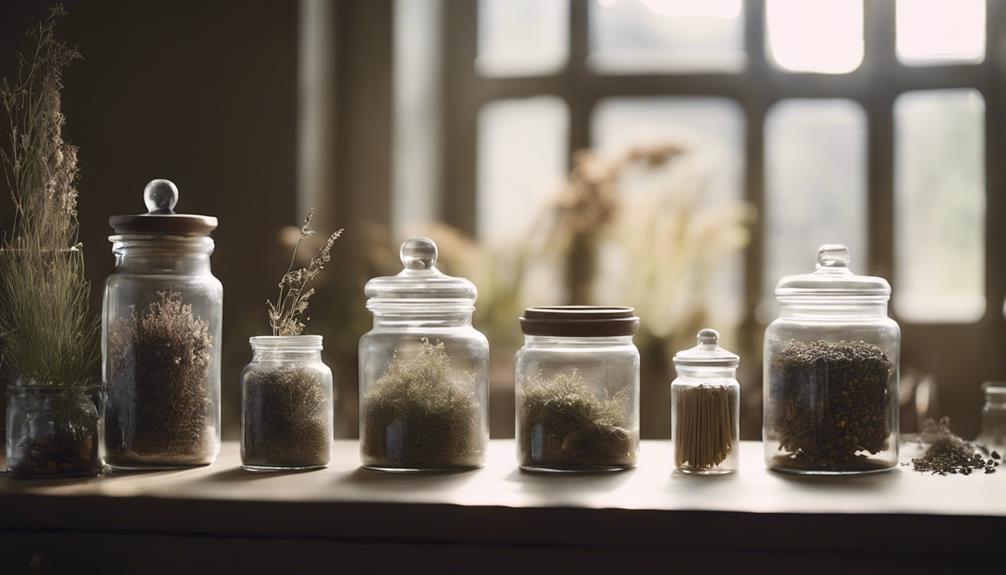
With over 20 years of experience in herbal medicine, Bevin Clare has established herself as a leading authority in the field. As a renowned herbalist and educator, she's made significant contributions to the development of modern herbalism. Her expertise in integrative healthcare and passion for blending traditional knowledge with modern scientific research have earned her recognition in the industry.
Some of Bevin Clare's notable achievements and affiliations include:
- Holding a Master of Science in Herbal Medicine and being a Registered Herbalist with the American Herbalists Guild
- Serving as the Program Director of the Herbal Medicine Department at the Maryland University of Integrative Health
- Publishing well-written works like 'Medicinal Plants at Home: More Than 100 Easy, Practical, and Efficient Natural Remedies'
- Collaborating with organizations like United Plant Savers to promote sustainable herbal practices
- Presenting at esteemed events like the International Herb Symposium, where she shares her knowledge with the herbal community
Frequently Asked Questions
Who Are the Famous Female Herbalists?
When we think about herbalism, we wonder who are the famous female herbalists? We've discovered that Rosemary Gladstar, Jeannine Parvati, Susun Weed, and Catherine Hunziker are just a few of the many influential women making a mark in this field.
Who Is the Most Famous Herbalist in the World?
We've seen how herbalism changed our grandma's life, and we're curious – who's the most famous herbalist in the world? According to experts, it's Rosemary Gladstar, renowned for her 40+ years of experience, teaching, and contributions to the field.
Who Is Brianna Cherniak?
We're talking about Brianna Cherniak, a clinical herbalist who founded Plant Life Company, creating sustainable, organic herbal remedies and products, offering consultations and workshops to educate on natural healing and holistic wellness.
Who Was the First Female Herbalist?
We're wondering who the first female herbalist was, and honestly, it's tough to pinpoint an exact individual, but we do know ancient civilizations like Egypt and Greece had female healers and herbalists playing pivotal roles in healthcare.
Conclusion
As we reflect on the trailblazing female herbalists featured here, their collective legacy unfurls like a verdant vine, entwining traditional wisdom with modern innovation.
Like a richly layered herbal remedy, their contributions blend diverse perspectives, empowering individuals and communities alike.
As we move forward, their pioneering spirit will continue to nourish the landscape of herbal medicine, fostering a brighter, more inclusive future for generations to come.

